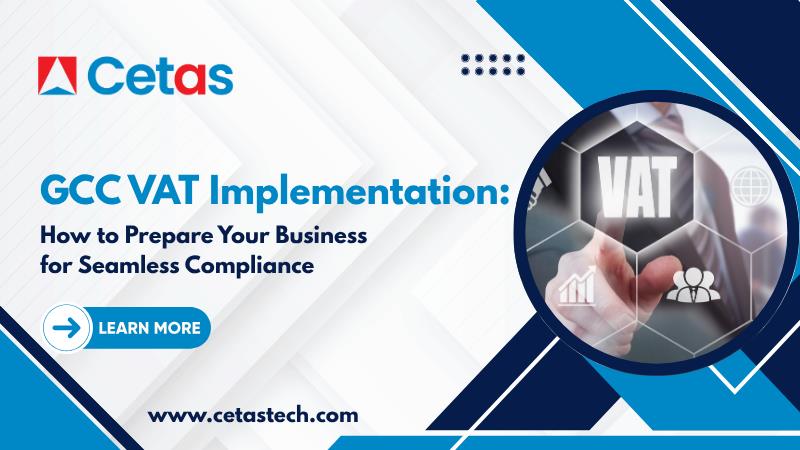GCC VAT Implementation: How to Prepare Your Business for Seamless Compliance
Is your business prepared for VAT in the Gulf Cooperation Council (GCC)? With the introduction of Value Added Tax (VAT) across GCC countries, organizations must ensure complete VAT readiness to avoid non-compliance penalties and operational disruptions.
Whether you’re a business owner evaluating ERP systems or an IT manager planning your company’s digital transformation, GCC VAT implementation is a strategic priority that requires early action, accurate configuration, and industry-aligned advisory.
In this guide, we’ll walk you through the essentials of VAT for GCC countries, its impact on your business, and how to implement VAT in ERP systems like Microsoft Dynamics 365 Business Central.
What Is GCC VAT and Why It Matters?
The GCC VAT Framework, introduced under a unified agreement between Gulf countries, aims to diversify revenue streams and modernize economic infrastructure. Initially enforced from January 1st, 2018, it mandates a 5% tax on most goods and services across member states, including:
- United Arab Emirates (UAE)
- Saudi Arabia
- Bahrain
- Oman
- Qatar
- Kuwait
Although adoption timelines vary by country, all GCC businesses are expected to comply with the regional VAT framework. This requires companies to evaluate their operations, update financial systems, and ensure accurate reporting for tax authorities.
Why GCC VAT Implementation Should Be a Priority?
Key Business Areas Affected by VAT
The introduction of VAT in GCC isn’t just a regulatory formality—it directly impacts:
- Product pricing and margins
- Procure-to-pay and order-to-cash cycles
- Cross-border and intercompany transactions
- Contractual obligations and supplier relationships
- Cash flow planning and liquidity management
- Accounting systems and compliance reports
These changes call for a VAT impact analysis, followed by a well-defined implementation roadmap that aligns business operations with tax regulations.
Microsoft Dynamics for VAT: A Smarter Way to Stay Compliant
If you’re using or considering ERP systems like Microsoft Dynamics 365 Business Central, you’re already a step ahead. Microsoft Dynamics provides GCC VAT-ready features including:
- Configurable tax setup
- Automated VAT calculation logic
- Country-specific localization packs
- Audit-ready reporting and digital invoicing
- Real-time dashboards for tax monitoring
At Cetas, we’ve helped numerous SMBs and enterprises across the region navigate their VAT transformation journey by aligning their ERP systems to meet GCC VAT requirements.
VAT Implementation Roadmap: Cetas Proven 7-Step Approach
To ensure a smooth transition to the GCC VAT regime, Cetas offers a comprehensive VAT implementation framework. Here’s how we help:
1. Impact Analysis and Business Process Mapping
We begin with a deep-dive review of your current operations and identify VAT impact zones, including:
- Classification of taxable vs. exempt items and services
- Changes in procure-to-pay and order-to-cash workflows
- Cross-border and intercompany transaction mapping
- Reviewing existing contracts, vendor agreements, and POs
2. ERP VAT Configuration and Tax Structure Setup
We configure tax areas and jurisdictions within your ERP, ensuring:
- Accurate VAT rates by item, location, and service
- Reverse charge mechanism support
- Tax groups and posting setups
3. ERP Upgrade, Patch Deployment & Training
- Deployment of GCC VAT patches for Microsoft Dynamics
- Functional and technical user training
- User acceptance testing (UAT) to validate compliance scenarios
4. Master Data Enrichment
- VAT grouping and tagging in your Chart of Accounts (COA)
- Vendor and customer master updates
- Item master classification (standard, exempt, zero-rated)
5. Transaction Data Review and Migration
We assess and, where needed, migrate:
- Opening balances and VAT-relevant historical transactions
- Open orders, invoices, and credit memos
6. Document Formatting & Numbering Compliance
- VAT invoice formats and automated numbering
- Localized tax documentation
- QR code support (where applicable)
7. Audit-Ready Reports & MIS Dashboards
Generate real-time dashboards and VAT reports for:
- Input/Output tax
- VAT return filing
- Reconciliation with accounting books and GAZT/FTA portals
Why Choose Cetas for Your GCC VAT Implementation?
Cetas brings over a decade of experience in Microsoft ERP consulting, with specialized expertise in:
- GCC VAT Compliance Consulting
- ERP VAT Configuration & Customization
- Industry-specific VAT implementation across Retail, Manufacturing, Distribution, and Services
- Post-go-live VAT support and change management
Our cross-functional teams—functional consultants, finance domain experts, and technical developers—work closely with your finance and IT departments to ensure that VAT implementation is not just a compliance checkbox but a catalyst for operational efficiency.
Prepare Now. Avoid Penalties Later.
GCC authorities are becoming increasingly strict in VAT enforcement, with audits, digital filing mandates, and real-time reporting requirements becoming the norm.
A reactive approach may lead to:
- Incorrect filings and financial penalties
- ERP rework and operational downtime
- Loss of customer trust and delays in transactions
Instead, adopt a proactive VAT readiness strategy with Cetas. From configuration to compliance, we offer an end-to-end solution tailored for Microsoft Dynamics VAT implementation and beyond.
Ready to Begin Your VAT Transformation Journey?
Contact us today to schedule a VAT readiness assessment and discover how we can help you align your business with GCC VAT requirements.

